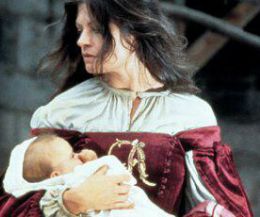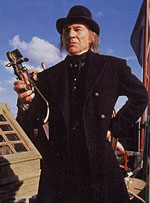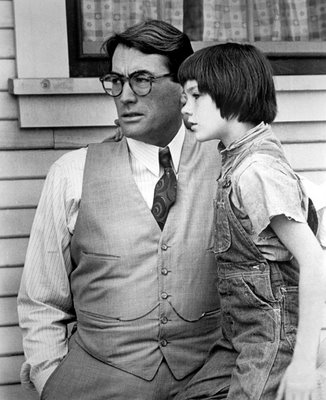 I just came back from the post office where I mailed off a bunch of PaperBackSwap requests. I logged in to my content management software here at Much Madness and discovered WordPress has an update. And it’s a slick one! Nice job, WordPress folks.
I just came back from the post office where I mailed off a bunch of PaperBackSwap requests. I logged in to my content management software here at Much Madness and discovered WordPress has an update. And it’s a slick one! Nice job, WordPress folks.
Anyway, to business. Rebels are those folks who buck the system. Sometimes they do it because they care. Sometimes they do it because they don’t. Here’s my list of the top ten rebels in literature (or at least in the part of it I’ve read).
 Huck Finn. As he tears up his letter to Miss Watson and says, “All right, then, I’ll go to hell,” well you just can’t get more badass than that. It’s incredibly brave, and he shows he will follow his own conscience. I think I understood for the first time this year after teaching the book for several years that Huck has to light out for the territory because he has to go somewhere that is not tainted by an antiquated morality he disagrees with—he’s simply too good for Missouri.
Huck Finn. As he tears up his letter to Miss Watson and says, “All right, then, I’ll go to hell,” well you just can’t get more badass than that. It’s incredibly brave, and he shows he will follow his own conscience. I think I understood for the first time this year after teaching the book for several years that Huck has to light out for the territory because he has to go somewhere that is not tainted by an antiquated morality he disagrees with—he’s simply too good for Missouri. Severus Snape: He defies the most powerful and fearsome dark wizard in recent memory, a man known for his ability to “read minds,” and spies for the Order of Phoenix and Dumbledore, and it’s all because he loved a woman so much that he is willing to do anything to protect her son, even though Harry was also the son of his worst enemy. Dumbledore once said that he thought sometimes Hogwarts sorted people too soon, and Harry told his son that Snape was probably the bravest man he ever knew. What Snape did—standing against his former master and all of his Slytherin friends—took a lot of guts.
Severus Snape: He defies the most powerful and fearsome dark wizard in recent memory, a man known for his ability to “read minds,” and spies for the Order of Phoenix and Dumbledore, and it’s all because he loved a woman so much that he is willing to do anything to protect her son, even though Harry was also the son of his worst enemy. Dumbledore once said that he thought sometimes Hogwarts sorted people too soon, and Harry told his son that Snape was probably the bravest man he ever knew. What Snape did—standing against his former master and all of his Slytherin friends—took a lot of guts. Hester Prynne: Marked as a fallen woman, she defies the villagers who label her, quite literally, as an adulteress and refuses to name the father of her daughter Pearl. She becomes such a help to the villagers that they come to associate her letter with “Able” rather than “Adultery.” In defiance of the villagers, she wears the letter (except for a brief moment when she is alone with Pearl and Dimmesdale) for the rest of her life to remind the villagers of their cruelty, hypocrisy, and judgment.
Hester Prynne: Marked as a fallen woman, she defies the villagers who label her, quite literally, as an adulteress and refuses to name the father of her daughter Pearl. She becomes such a help to the villagers that they come to associate her letter with “Able” rather than “Adultery.” In defiance of the villagers, she wears the letter (except for a brief moment when she is alone with Pearl and Dimmesdale) for the rest of her life to remind the villagers of their cruelty, hypocrisy, and judgment. Katniss Everdeen: She defies the entire capitol during the Hunger Games and becomes a symbol for the districts as they rebel, led by District 13. She is hard and tough, but she loves her family and friends fiercely. Rebellious to the end, she kills President Coin when she realizes the woman is no different than her arch-enemy President Snow.
Katniss Everdeen: She defies the entire capitol during the Hunger Games and becomes a symbol for the districts as they rebel, led by District 13. She is hard and tough, but she loves her family and friends fiercely. Rebellious to the end, she kills President Coin when she realizes the woman is no different than her arch-enemy President Snow. Captain Ahab: He threw his entire crew under the bus in his quest for Moby Dick, and he wouldn’t listen to reason. He refused to help the captain of the Rachel look for his lost son. His single-mindedness both terrified and enthralled the crew of the Pequod. In the end, only Ishmael is left to tell the tale of the driven captain who defied even God in his quest to pursue vengeance.
Captain Ahab: He threw his entire crew under the bus in his quest for Moby Dick, and he wouldn’t listen to reason. He refused to help the captain of the Rachel look for his lost son. His single-mindedness both terrified and enthralled the crew of the Pequod. In the end, only Ishmael is left to tell the tale of the driven captain who defied even God in his quest to pursue vengeance. Dorian Gray: In defiance of mores of his time, he lives exactly how he wants to live while his enchanted portrait bears the scars of his sins. He lives a completely hedonistic lifestyle. He treats people however he wants, even destroying or killing them if they get in his way. He is a man without a conscience who lives by his own set of rules and never has to pay for his crimes. Until the end, that is.
Dorian Gray: In defiance of mores of his time, he lives exactly how he wants to live while his enchanted portrait bears the scars of his sins. He lives a completely hedonistic lifestyle. He treats people however he wants, even destroying or killing them if they get in his way. He is a man without a conscience who lives by his own set of rules and never has to pay for his crimes. Until the end, that is. The Lorax: He stands up against the Once-ler in an attempt to protect the environment. He alone knows where greed and destruction of the Truffula trees will take their once-beautiful home, and he keeps crying out, even though the Once-ler shows no signs of listening.
The Lorax: He stands up against the Once-ler in an attempt to protect the environment. He alone knows where greed and destruction of the Truffula trees will take their once-beautiful home, and he keeps crying out, even though the Once-ler shows no signs of listening. Guy Montag: At the beginning of [amazon_link id=”0345342968″ target=”_blank” ]Fahrenheit 451[/amazon_link], he is a fireman who relishes his job burning books. As the story progresses, he defies his whole society once he realizes how keeping books and information from his society has kept them in the darkness of ignorance. He joins up with a group of book-lovers determined to preserve literature for the future.
Guy Montag: At the beginning of [amazon_link id=”0345342968″ target=”_blank” ]Fahrenheit 451[/amazon_link], he is a fireman who relishes his job burning books. As the story progresses, he defies his whole society once he realizes how keeping books and information from his society has kept them in the darkness of ignorance. He joins up with a group of book-lovers determined to preserve literature for the future. Atticus Finch: He does the unthinkable in his society—he actually defends a black man accused of raping a white woman. Atticus is licked even before he begins because of the racism entrenched in his society, but he does it anyway because it’s the right thing to do, even if it will make him unpopular in town.
Atticus Finch: He does the unthinkable in his society—he actually defends a black man accused of raping a white woman. Atticus is licked even before he begins because of the racism entrenched in his society, but he does it anyway because it’s the right thing to do, even if it will make him unpopular in town. Juliet: She defies her family’s ancient feud with the Montagues by falling in love and marrying Montague’s son Romeo. Juliet even chooses her new husband over her own family after Romeo kills Tybalt. Rather than marry a man her family chooses for her, Juliet feigns her death. If only that messenger hadn’t been waylaid by the quarantine for the plague and Romeo had received Friar Lawrence’s message! When she awakes and discovers Romeo, believing she was truly dead, has committed suicide, she kills herself by stabbing a dagger into her own heart rather than continuing to live without her Romeo.
Juliet: She defies her family’s ancient feud with the Montagues by falling in love and marrying Montague’s son Romeo. Juliet even chooses her new husband over her own family after Romeo kills Tybalt. Rather than marry a man her family chooses for her, Juliet feigns her death. If only that messenger hadn’t been waylaid by the quarantine for the plague and Romeo had received Friar Lawrence’s message! When she awakes and discovers Romeo, believing she was truly dead, has committed suicide, she kills herself by stabbing a dagger into her own heart rather than continuing to live without her Romeo.
Top Ten Tuesdays is hosted by The Broke and the Bookish.